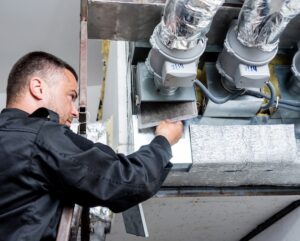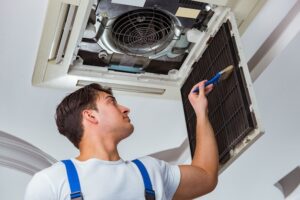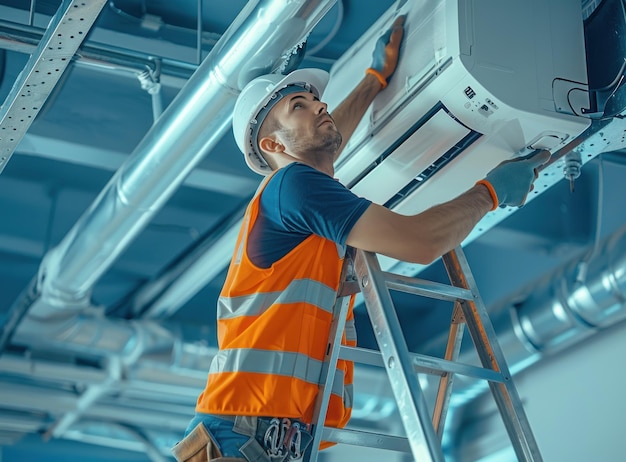How to Protect Your HVAC System During Wilmington’s Hurricane Season
Wilmington, NC, is all too familiar with the effects of hurricane season. From the destruction that Hurricane Florence left behind to storms more recently, residents have learned firsthand how quickly serene weather can turn into life-threatening conditions. Of the many dangers hurricanes present, the HVAC system is usually overlooked. But these critical systems are particularly prone to storm-induced damage—ranging from strong winds and flooding to debris that can readily harm or destroy outside units. With the wrong measures in place, homeowners may be subjected to expensive repairs or even full replacement, compounding the frustration and expense of a post-storm recovery.
Trust our HVAC Specialists in Wilmington, NC to fortify your system and keep your family safe when storms strike.
And if you’re not ready, thousands can be in damage to fix—or in some situations, even a completely new system. The upside is that there are steps that you can take to significantly reduce the risk with the correct preventative measures. This blog will guide you through seven innovative steps towards HVAC hurricane preparedness in Wilmington to protect your system when the next hurricane comes around.
7 Ways to Get HVAC Hurricane-Ready

Wilmington hurricanes pose a threat to your heating and cooling appliances in your house. From flying debris to power surges and flooding, your HVAC needs to be hurricane-ready. The following seven Wilmington HVAC hurricane tips point out securing exterior AC units and storm-proofing air conditioners—all of which will help you minimize damage and expensive repairs.
1. Secure Your Outdoor Unit Against High Winds
Your outside condenser unit is fully exposed and, as such, extremely susceptible to high winds and airborne trash. Without anchoring, hurricanes are very likely to knock over or knock loose, resulting in severe damage or total loss of attachment to the ground. To prevent this, use hurricane straps or heavy-duty metal supports that are Wilmington-approved. These supports provide firm anchoring and allow your unit to resist even heavy wind loads.
⚓ Local Tip: As a coastal city, Wilmington’s salt air can erode metal brackets over time. Regular inspection/maintenance is crucial!
Inspect your brackets for rust or wear always, but especially before hurricane season. If you are unsure if your unit is anchored properly, our professional HVAC anchoring services can check and anchor it to storm-proof levels.
2. Turn Off the HVAC System Before the Storm Hits
Leaving your HVAC system on in a hurricane exposes it to power loss-related electrical surges and lightning. Your system’s delicate electronics will be ruined by these power surges, which will require expensive repairs or, worse still, have the unit replaced entirely. Prevent this from happening by switching off your HVAC system at your breaker panel before the storm gets to you. In addition to preserving your equipment, this keeps other electrical damage in your house from occurring.
⚠️ Exception Notice: Never reconnect HVAC systems yourself when using backup generators. Improper connections risk back-feeding hazards or equipment damage during outages.
Contact our Wilmington emergency HVAC services if you require help with shutting down properly.
3. Clear Debris and Trim Vegetation
Flying objects are also one of the most common HVAC damage caused by hurricanes. Trash cans, potted plants, toys, or outdoor furniture can all be flying objects in gusts of wind and can deliver a nasty shock to your exterior AC unit. In addition to this, hanging branches or trees nearby can hit the unit, falling on and crushing it or blocking airflow.
In Wilmington, palm fronds are a particular problem—their stiff, coarse tips can puncture the casing on your unit or snap thin coil fins. Take a minute to blow loose trash off and mow grass back from your condenser unit at least 2–3 feet to protect your system. For additional advice on getting your AC clean and storm-ready, check out our guide on preventing AC damage through yard prep.
4. Lift Outdoor Units in Flood Zones
Flooding is likely to be the most destructive force throughout Wilmington’s hurricane season—especially in areas on lower ground near the sea or rivers. As the water rises, ground-level outdoor HVAC units are some of the first to be damaged by water. This is why it is crucial to lift your outdoor condenser unit if you happen to be in a flood zone.
Professional HVAC installers can install raised metal pedestals or concrete slabs at least 12 inches above the ground to protect your system from flash floods or standing water. This inexpensive investment is worth its while in prolonging the lifespan of your system. Please find out more on how to take your installation up a notch through our flood-resistant HVAC installation services.
5. Install a Surge Protector
Power surges are the primary reason for HVAC system failure caused by hurricanes. Power surges, usually caused by fallen power lines or lightning, often destroy sensitive components such as compressors, control boards, and thermostats. It is estimated that almost 80% of storm-related HVAC damage results from power surges.
🛡️ The Best Defense? A professionally installed whole-house surge protector shields HVAC systems and appliances by intercepting voltage spikes. Essential for Wilmington’s hurricane season – add this to your storm prep checklist now.
6. Cover the Unit—But Do It Right
It’s a great idea to cover your outside unit to keep it from being damp and dirty, but it matters what you cover it with. Covering it with the wrong thing could actually give you more issues than it solves. In order to effectively protect it, you’ll want to cover it with a breathable, waterproof AC cover. They prevent trash from entering the fan housing but are vented to allow moisture to escape in order to prevent you from getting internal rust and mildew buildup.
🚫 Avoid This Error: Never use plastic sheets or garbage bags to cover equipment – they trap condensation and accelerate corrosion. Remove covers immediately after storms to ventilate and prevent overheating. This simple storm-proofing habit protects AC systems from long-term damage.
7. Schedule a Pre-Storm Inspection
Just as you prepare your home, your HVAC system also needs to be professionally maintained before the hurricane season. A professional will inspect key components such as refrigerant levels, electrical connections, mounting stability, and drainage systems in order to ascertain that everything is in working order.
This is particularly significant in Wilmington, where changing humidity and exposure to salt over time can slowly wear your system away. A pre-storm tune-up can identify minor problems before they turn into hopeless failures during a hurricane.
🛟 Need Assistance? Our emergency HVAC maintenance plans include priority storm-season service and readiness checks – ensuring you’re never left without climate control during Wilmington’s toughest weather.
Wilmington-Specific Hurricane HVAC Tips

Coastal living has other HVAC issues. From Wilmington flood plains to salt-tainted air, localized system maintenance is necessary for your equipment. These quick tips cover coastal HVAC protection during and after the storm.
- Salt Air Corrosion: Use anti-corrosive paints on outdoor units to combat rust due to Wilmington’s salty coastal air.
- Post-Storm Mold Hazard: Run dehumidifiers following the storm to discourage mold growth in ducts and HVAC equipment.
- Granting Know-How: Always ensure that HVAC repair or replacement is performed according to New Hanover County permit regulations following the storm.
🌪️ Storm Emergency? We provide 24/7 restoration services – Wilmington’s harsh weather meets our rapid-response team, day or night.
What to Do After the Hurricane Passes
After the storm has passed, you must inspect your HVAC system safely before operating it. Steps following the storm prevent damage from being carried out and permit safe operation.
- Clean Debris: Clear leaves, branches, mud, and any water that may be standing around the unit to provide airflow and avoid corrosion hazards.
- Dry Electric Components: Let the unit air dry for at least 24 hours—moisture in electric components can lead to shorts or permanent damage.
- Test the System Out: After another operation, listen for strange noises or feel restricted airflow—both could be warning signs of sleeping storm damage.
Call a professional if:
Water has extended to electrical components: This is a severe safety hazard and should be corrected by a professional technician.
The unit shifts or shows visible damage: Loose or improperly aligned units may reduce performance and safety.
FAQs:
Should I cover my HVAC unit during a hurricane?
Yes—use a permeable cover, not plastic. Take it off as soon as the storm has passed to prevent condensation of moisture, rust, and damage to internal components.
Can I power my HVAC with a generator?
Improper installation alone, however, can only produce deadly overloads or wreck your HVAC equipment unless and only if professionally installed and appropriately sized.
How much does hurricane-proofing Wilmington cost?
You should pay $200–$1,500 for basic upgrades like hurricane straps, raised pads, and surge protectors. Get a free quote from our local specialists today.






